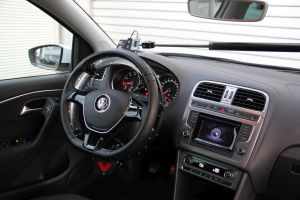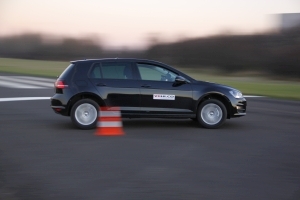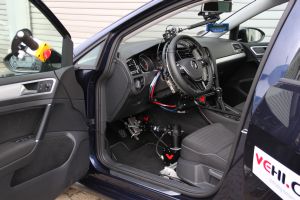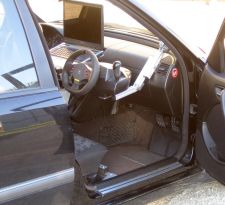Testing of passive safety systems
Unmanned possible with driving robots from VEHICO!
Misuse tests are an essential part of vehicle testing to accurately tune the vehicle's own sensors.
With the help of the VEHICO steering and pedal robots and the CO.Remote control system, it is possible to carry out these tests without a test driver being present in the vehicle.
Test Equipment
Required Components

Steering Robot
Our entire range of steering robots is suitable for misuse tests and the test vehicle can be quickly equipped with them.

Pedal Robot Flex Series
The flex series pedal robots with accelerator and brake robots can be used in conjunction with our driving dynamics control systems.

Driving Dynamics Control
With the help of the VEHICO CO.Remote system, the positioning commands are transmitted from a remote control to the driving robot.
Test Equipment
Despite the dangerous test runs, which also involve extreme physical strain, these tests are still primarily completed with test drivers today. With the help of VEHICO steering and pedal robots and the CO.Remote control system, it is possible to perform misuse tests without a test driver being present in the vehicle. Misuse tests generally do not require very high tracking accuracy, so remotely steering the vehicle is perfectly sufficient to hit a sandbag or pile of gravel. Our driving robots are quick to install and easy to operate. With CO.Remote, cost-intensive GPS/INS sensor technology can be dispensed with. This means that a commercially available vehicle can be converted into an unmanned remote-controlled test vehicle in a very short time and at minimal cost.
If the tracking accuracy of the remote-controlled vehicle is not sufficient, it is easy to upgrade to a VEHICO CO.Drive system. Here, the entire driving manoeuvre can be programmed and then executed automatically and with the highest precision.

Misuse Test
The term misuse test covers the tests that vehicle manufacturers carry out in extensive test runs directly on the vehicle concerned in order to be able to adjust the vehicle's own sensors accurately.
The best known are the following:
- driving over a ramp on one side with only one vehicle lane or with full overlap
- driving through a gravel bed at 80 km/h
- simulation of a game accident by frontal impact on a 50kg sandbag at 85 km/h
- driving the test vehicle into a pile of gravel
Test Description
In all misuse tests, the vehicle's own sensors, such as the airbag sensors, must detect, that it is not a life-threatening driving situation and that an airbag deployment must not occur.
Test Procedure
The test vehicle will be equipped with a steering robot and pedal robot in a short time. Special radio communication allows the driving robot to be controlled by means of a radio remote control. The user can choose between a classic lever remote control, a pistol remote control or a steering wheel and pedal system. In addition, the operator can also receive information from the test vehicle, such as the current vehicle speed or a video transmission from the driver's perspective. Driving the test vehicle can thus be done easily either from a stationary point on the test track or from an accompanying support vehicle.

Misuse
Advantages of the VEHICO driving robots
short conversion time of the test vehicle
The driving robots can be instal-led in almost any commercially available vehicle in a very short time. This means that the set-up time is very short, which in turn saves costs!
unmanned Driving Misuse Tests
By using VEHICO technology, the dangerous tests, which also involve extreme physical stress for the test driver, can be completed without a driver in the test vehicle.
quick installation and easy operation
With our driving robots, the con-trol parameters no longer have to be set. This means that the driving tests can be started directly after the quick installation.
Contact
Contact us
Do you have further questions or need more information?
We will be pleased to help you.
Contact us or one of our Salespartner.
Phone
+49 531 20835 110
